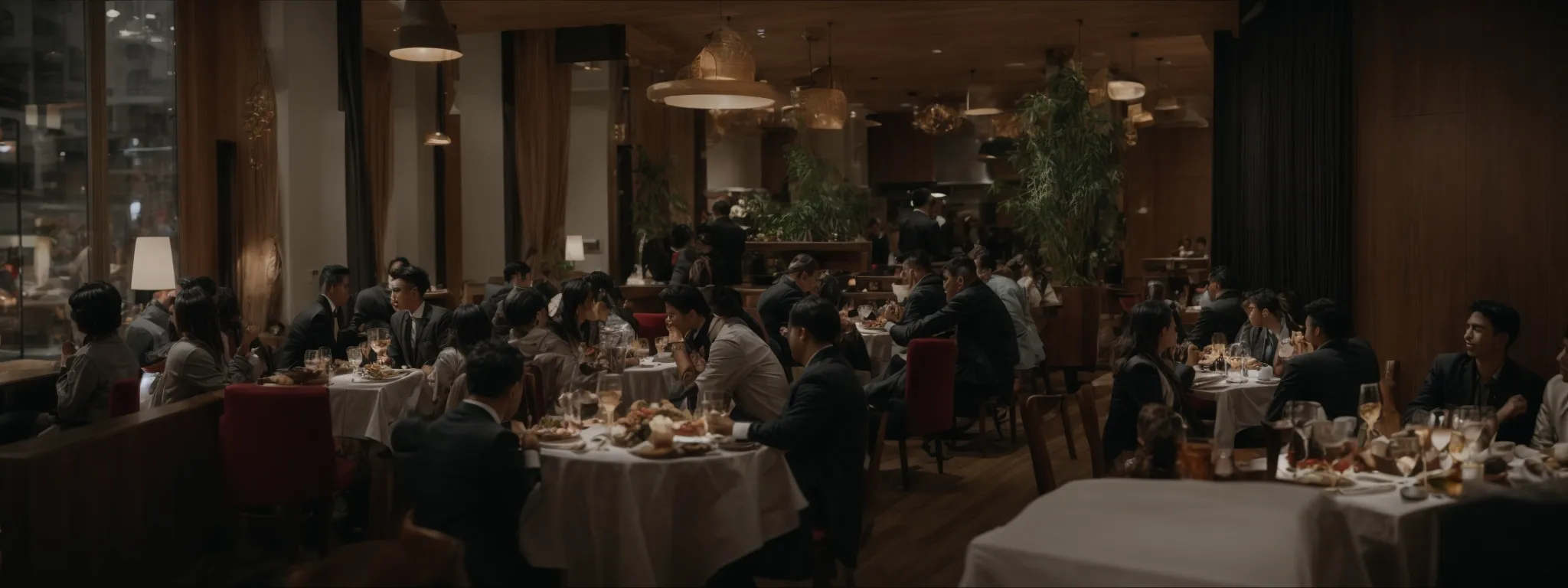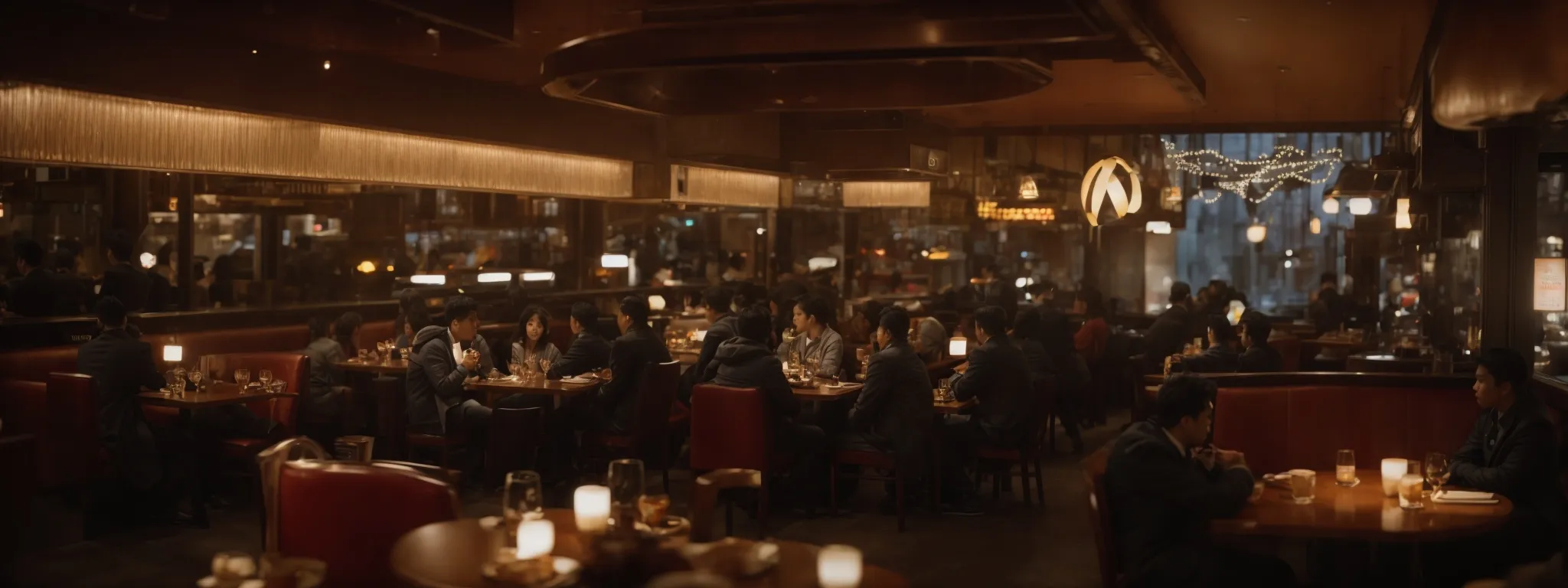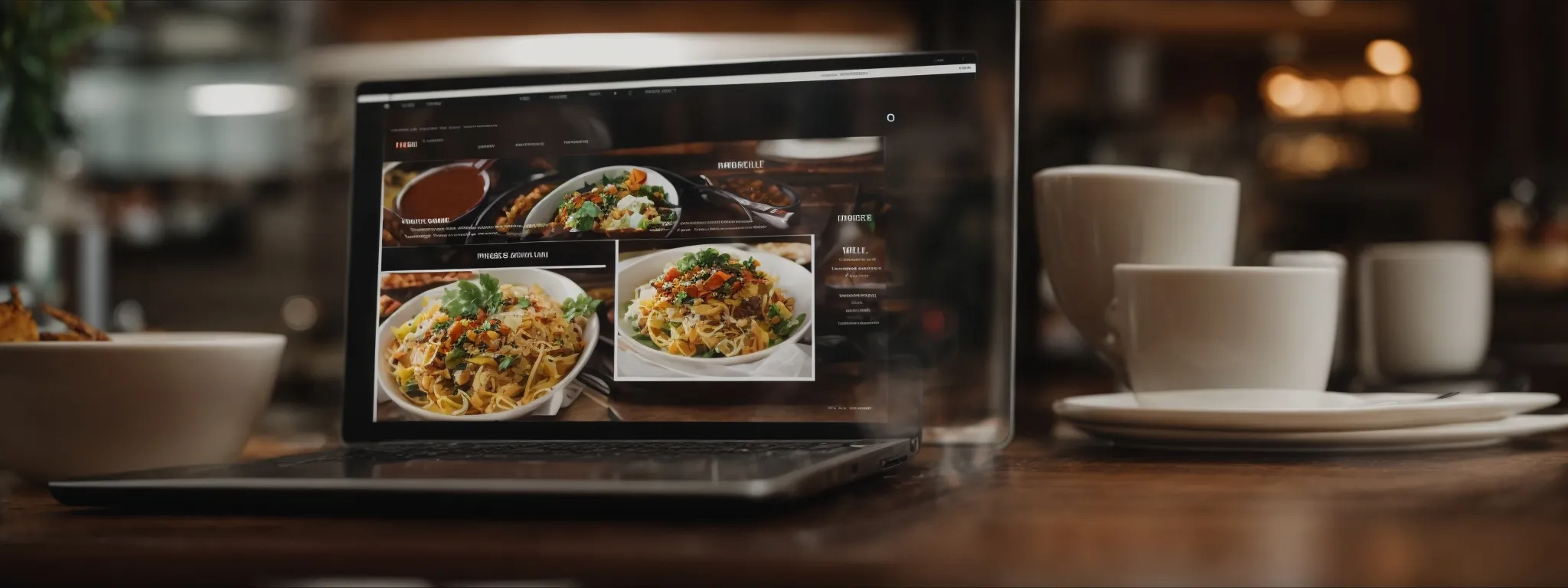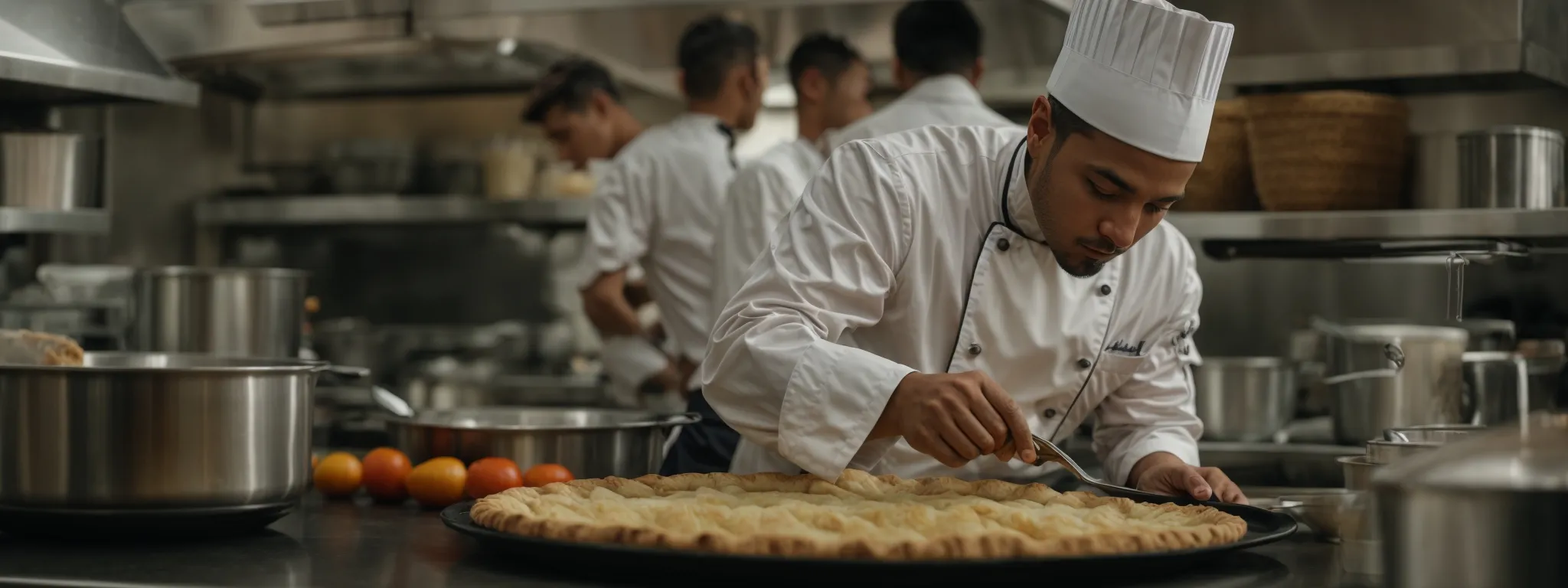Restaurant SEO Tips: Savoring Online Success
Restaurant SEO Strategies: A Recipe for Online Success Navigating the competitive landscape of the restaurant industry demands a robust online presence, and search engine optimization is the […]
Restaurant SEO Strategies: A Recipe for Online Success
Navigating the competitive landscape of the restaurant industry demands a robust online presence, and search engine optimization is the secret sauce to achieving that visibility.
LinkGraph’s expertise in SEO equips restaurant owners with the tools to season their web pages for the top of search results.
From a tailored local seo strategy that positions a pizza place as the heart of the neighborhood to a full-service plan that encompasses on-page SEO services and blog writing, the ability to draw in more patrons online is invaluable.
Keep reading to uncover the proven techniques and services that can transform your restaurant website into a magnet for hungry customers.
Key Takeaways
- Restaurant SEO Is Crucial for Enhancing Visibility and Attracting Local Diners
- A Robust SEO Strategy for Restaurants Must Include Optimized Google My Business Listings and Local Keywords
- Strategic Link Building and Engaging Content Are Essential for Increasing a Restaurant’s Digital Authority
- Customer Reviews Significantly Contribute to a Restaurant’s Search Relevance and Online Reputation
- Continuous Analysis and Adaptation of SEO Strategies Are Necessary to Respond to Changing Search Trends and Algorithms
Crafting Your Restaurant SEO Strategy for Maximum Visibility

In the competitive landscape of the restaurant industry, achieving prominence in search engine results is essential for attracting a steady stream of guests to your establishment.
Effective search engine optimization for restaurants—often termed “restaurant SEO”—employs strategic measures aimed at enhancing the discoverability of a restaurant’s website by potential patrons.
Optimizing your restaurant’s digital footprint pivots on a deep understanding of your existing online presence, the selective identification of keywords that resonate with your dining niche, and insight gleaned from a thorough analysis of competitors’ SEO undertakings.
With these foundational assessments in place, restaurant owners can develop clear-cut SEO goals that are not only attainable but also measurable, steering their business toward enhanced visibility within their local area.
It’s through this meticulous planning that a restaurant can cultivate brand awareness and savor the taste of online success.
Assess Your Current Online Presence
To embark on a well-orchestrated restaurant SEO campaign, one must first conduct an incisive audit of their current online status. This scrutiny reveals the performance of the restaurant’s website in search engines and provides a benchmark from which progress can be measured.
For a comprehensive overview, restaurateurs should engage in a free SEO audit, readily available through LinkGraph’s suite of SEO services. This audit lays bare the strengths and shortcomings of a restaurant’s digital identity:
- Examination of the website’s visibility on search engines
- Assessment of the restaurant’s local SEO reach, including how it stacks against nearby competition
- Inspection of the restaurant’s Google Business Profile to ensure accuracy and optimization
Research Relevant Keywords for Your Dining Niche
Embarking upon keyword research marks a pivotal step in the optimization journey, one that identifies the specific search terms most likely to attract potential customers to a restaurant’s website. By utilizing LinkGraph’s SearchAtlas SEO software, a powerful keyword research tool, restaurant owners can uncover the exact phrases and culinary terms their target audience is searching for, from “Kansas City pizza restaurant” to “neighborhood vegan eats.”
Through intelligent analysis of data sources, an SEO consultant employs the SearchAtlas software to distill a list of keywords that not only epitomize the essence of a restaurant’s menu offerings but also align with the search queries of an intended consumer base. This carefully tailored approach ensures that a restaurant’s content strategy resonates with the palate of its prospective guests, enhancing web traffic and elevating website rank in the search engine results pages.
Analyze Competitor SEO Strategies for Insights
An in-depth analysis of competitor SEO practices offers restaurant owners critical insights into what drives the highest levels of engagement within their particular culinary sector. By observing how competing dining establishments utilize keywords, manage their backlinks, and create content, businesses can pinpoint opportunities for differentiation and identify gaps in their own strategies.
LinkGraph’s SEO services extend beyond simple analytics, enabling a restaurant to break down the SEO frameworks of its rivals with precision. This strategic insight, coupled with the expertise of seasoned SEO consultants, empowers a restaurant to refine its own SEO maneuvers to stand out in a crowded marketplace.
Set Attainable SEO Goals for Your Restaurant
Setting achievable goals for restaurant SEO can be likened to crafting a fine menu – it requires precision and an understanding of what can be delivered with excellence. A restaurateur should establish specific, measurable objectives such as improving the restaurant’s search rankings for select niche keywords or increasing the conversion rate from website visitors to actual dining patrons. These goals serve as fundamental milestones in the pursuit of a robust online presence that mirrors the quality of the dining experience offered.
Regular evaluation against these targets is crucial, enabling the restaurant to adapt its approach in real-time. Whether the aim is to enhance their Google local search standing or to bolster user engagement through a more intuitive online ordering system, LinkGraph’s Suite of SEO Services provides the necessary insight and expertise to measure progress and pivot strategies effectively.
Enhancing Your Restaurant’s Local SEO Appeal

For the restaurateur intent on seasoning their local presence with stronger visibility, the sizzle of success begins with enhancing local SEO.
This strategy ensures that when a hungry searcher in the area seeks out a culinary experience, it’s your establishment that rises to the top of search engine results pages.
To achieve this, a restaurant must cast a keen eye on their Google My Business listing, embed local keywords within their premium content, and intertwine their brand with local happenings and communal platforms.
This trifold approach encourages the savory aromas of your eatery to infuse the digital neighborhood, drawing patrons in with the promise of a memorable dining experience amidst the comforts of their own locale.
Optimize Your Google My Business Listing
Local search relevance is paramount for restaurants aiming to capture the attention of nearby diners, and a critical component of this relevance is the meticulously optimized Google My Business (GMB) listing. An updated, comprehensive GMB profile not only elevates a restaurant’s visibility but also serves as the diner’s portal to the restaurant’s story, menu specialties, and culinary ethos.
LinkGraph’s SEO experts recognize the power of a well-honed GMB listing and advise clients on optimizing each aspect, from ensuring NAP (Name, Address, Phone number) consistency across the web to encouraging and managing customer reviews, which directly contribute to a restaurant’s online reputation and search rankings.
Leverage Local Keywords and Phrases
Integrating local keywords and phrases into a restaurant’s SEO strategy ensures that the menu offerings and distinct culinary style reach the right audience. This tailored approach emphasizes the venue’s connection to the region, turning search terms like “downtown Denver sushi bar” or “Bay Area organic brunch” into beacons that guide local searchers directly to the restaurant’s doors.
Deploying these strategically selected local keywords elevates a restaurant’s relevance on the search results page when potential patrons scour the internet for their next dining destination. The process unfolds methodically:
- A restaurant determines the key terms and vernacular specific to its locale and cuisine.
- SEO specialists embed these phrases into the web page’s title tags, descriptions, and content.
- These efforts proliferate across the restaurant’s online channels, fortifying local search presence and attracting regional diners.
It is this integration of geo-specific keywords that transforms a passive online presence into a dynamic force, one that smartly aligns with the search habits and preferences of the local populace. As a result, the restaurant stands as a prominent option for both serendipitous searchers and purposeful patrons alike.
Engage With Local Events and Community Pages
Participation in local events and active engagement on community pages serve as potently organic avenues for restaurants looking to season their local SEO efforts. These interactions are not merely about brand visibility but also about fostering meaningful connections with the area’s residents, who can become loyal patrons and vocal advocates for the restaurant.
LinkGraph’s SEO services understand the impact of community involvement, advising clients to deftly weave their brand’s narrative into the local tapestry through sponsorships, event participation, and presence on neighborhood digital platforms. This engenders a sense of community integration, essential for building a trusted and recognized local dining destination.
Building a Link Network to Elevate Your Restaurant

In the digital era, a restaurant’s success hinges not only on the sumptuous dishes served but also on its ability to forge a robust online network.
Mastering the art of link building is akin to perfecting a secret recipe for visibility and reputation in the vast online culinary landscape.
Establishing connections with relevant partners, crafting content that beckons the attention of food bloggers, and showcasing the brand’s delectable offerings in local food events are strategic servings that create a well-rounded link-building campaign.
Each connection acts as a vital ingredient, enhancing the restaurant’s overall SEO potency, driving website traffic, and ultimately positioning the establishment as a leader in both the digital and gastronomic realms.
Identify Potential Link-Building Partnerships
Forging strategic link-building partnerships stands as a cornerstone of any robust restaurant SEO strategy. These collaborative efforts with culinary blogs, local business directories, and event organizers not only amplify a restaurant’s credibility but also propel its website up the ranks in search engine results.
LinkGraph’s white label link building service meticulously curates these relationships, ensuring that each backlink serves as a potent conduit for increased web traffic. The company’s approach involves connecting with authoritative domains within the restaurant’s niche to enhance its digital authority and drive a targeted audience to its web pages.
Create Shareable Content for Food Bloggers and Critics
In the realm of restaurant marketing, content is king, and catering to the palates of food bloggers and critics can set the table for enhanced visibility. By crafting insightful, engaging content that food aficionados are compelled to share, a restaurant elevates its profile not only among critics but also within the broader foodie community.
Strategic relationships with these influencers can result in a cascade of benefits, including backlinks from esteemed sites and social media buzz:
- LinkGraph’s blog writing services develop articles that highlight a restaurant’s unique dishes and culinary philosophy, ripe for sharing across food review sites and critic blogs.
- Engaging with food critics through guest posting services on prominent platforms introduces the restaurant to new audiences, potentially increasing its sphere of influence.
Participate in Local Food Festivals and Events for Exposure
Immersion in local food festivals and events is a pivotal tactic for restaurants seeking to bolster their SEO and market their brand. These live experiences serve as tangible touchpoints with the community, creating memorable interactions that can translate into digital engagement and improved online visibility.
By showcasing their culinary talents on the local stage, restaurants can generate buzz and social media content that naturally garners backlinks and mentions. This type of organic exposure is invaluable: it boosts a restaurant’s prominence on the web and acts as a signal to search engines, thus contributing positively to SEO results.
- Restaurants can capture the essence of events by encouraging attendees to share their experiences on social media, linking back to the restaurant’s site.
- Participation can lead to connections with local influencers and media, who may feature the restaurant in content-rich articles.
- These efforts culminate in increased search relevance and stronger community ties, contributing to a broader SEO strategy.
Optimizing Your Menu for SEO Success

Within the vibrant digital age, a restaurant’s online menu serves a dual purpose: not only does it entice potential diners with a preview of culinary delights, but it also plays a pivotal role in the establishment’s SEO strategy.
A carefully crafted online menu, imbued with meticulously selected keywords, can lead to remarkable improvements in search engine rankings.
By adopting schema markup, restaurants can make their dishes more visible to search engines, enhancing the discoverability of their offerings.
Additionally, creating content that centers around signature dishes deepens the engagement with the target audience, turning every course listed into a potential hook for increased web traffic and patronage.
This pivotal step in SEO optimization ensures that a restaurant’s menu transcends its traditional function, becoming a cornerstone of a comprehensive digital marketing strategy.
Incorporate Keywords Into Your Online Menu Descriptions
Strategic incorporation of keywords into online menu descriptions is an essential ingredient in the recipe for a restaurant’s SEO success. By weaving target search terms into the fabric of menu item narratives, a restaurant not only whets the appetite of would-be diners but also signals relevance to search engines, amplifying the establishment’s visibility.
Ensuring accurate keyword placement transforms each dish listed into a digital beacon, guiding hungry searchers to the restaurant’s website. The precision in choosing these keywords matches that of a chef’s selection of spices: careful, considered, and designed to create the perfect blend:
- Chefs craft their menus to highlight unique flavors; similarly, SEO experts select keywords that best represent the restaurant’s fare.
- Menus are updated seasonally to reflect fresh ingredients; SEO strategies too need regular refinement to stay current with search trends.
- Just like a signature dish can define a restaurant, a well-placed keyword can distinguish an online menu in a crowded digital marketplace.
Use Schema Markup to Highlight Menu Items to Search Engines
The strategic application of schema markup to a restaurant website’s menu cannot be understated, acting as a secret ingredient to enhance visibility to search engines. This technique structures data in a manner that search engines can digest more efficiently, rendering menu items more prominently in search results, which is critical for attracting the modern, convenience-seeking consumer.
In the hands of LinkGraph’s SEO Specialists, schema markup becomes a pivotal part of articulating the nuances of a restaurant’s offerings directly to search engines. This translates to an improved user experience for searchers, as they are presented with highlighted and accessible menu information within the search results, potentially increasing click-through rates and driving more foot traffic to the establishment.
Create Engaging Content Around Signature Dishes
In the culinary world, signature dishes are the heart and soul of a restaurant’s identity, capturing the essence of their brand in each carefully prepared bite. When these central elements are harnessed within a restaurant’s content strategy, the allure of these special menu items is broadcasted to a wider audience, inviting engagement and conversation online.
A content campaign that spotlights a restaurant’s celebrated dishes can stoke the embers of curiosity and drive consumer interest. Savvy restaurateurs pivot this online traction into tangible restaurant visits and heightened brand loyalty:
| Engagement Tactic | Outcome |
|---|---|
| Feature stories on signature dish origins | A deeper connection with the brand’s narrative |
| Culinary blog posts with chef insights | Authority as a leading voice in the cuisine space |
| Social media highlights of patrons’ experiences | Amplified reach and consumer-generated content |
| Video content with behind-the-scenes looks | Increased visitor time on the website |
Garnering Reviews to Boost Your SEO Efforts

The digital culinary landscape is a vast, interconnected space where the symbiotic relationship between quality service and customer feedback plays a pivotal role.
For the discerning restaurant owner, positive endorsements from satisfied patrons serve as a valuable currency in the quest for SEO enrichment.
The virtuous cycle of soliciting, responding to, and incorporating online reviews into a restaurant’s SEO content strategy has become an indispensable facet of digital success.
This strategy not only projects a narrative of active consumer engagement but also augments a restaurant’s rankings, ensuring it is perched favorably within the search engine results.
Engaging with client feedback exemplifies attentive customer service—transforming patrons’ satisfaction into valuable SEO assets and empowering restaurateurs to harness the full potential of their online reputation.
Encourage Satisfied Customers to Leave Online Reviews
Achieving a resonance in the search engine results can be significantly amplified through the endorsement of dining guests. Urging satisfied customers to leave positive reviews is an astute move, boosting search visibility and cementing a restaurant’s reputation.
These testimonials are more than mere commendations; they act as fresh content that search engines evaluate for relevance and authenticity. LinkGraph’s suite of SEO services guides restaurants in leveraging these user-generated accolades to enhance their digital standing:
| SEO Dimension | Function of Customer Reviews |
|---|---|
| Relevance | Reviews containing keywords improve search relevance |
| Content Freshness | New reviews signal active engagement and updated content |
| Customer Trust | Positive feedback boosts confidence in future patrons |
| Local SEO | Mentions of location in reviews fortify local search rankings |
Respond to Reviews to Show Engagement and Improve Rankings
Proactive engagement with customer reviews is a significant aspect of a restaurant’s online management that can influence its search engine standings. By thoughtfully responding to both praise and criticism, a restaurant underscores its commitment to customer satisfaction and can inadvertently optimize its search engine results through increased activity and keyword usage.
LinkGraph’s SEO Tools empower restaurant owners to efficiently monitor and address online feedback, thus signaling to search engines that the establishment values its patrons and is a relevant contender for top search result placement. This elevated attention to consumer interactions online not only fortifies a restaurant’s credibility but also enhances its overall SEO health.
Utilize Positive Reviews in Your SEO Content Strategy
In a sound SEO content strategy, integrating positive reviews is akin to seasoning a dish to perfection; it enhances the flavor of a restaurant’s narrative, allowing potential patrons to savor the experiences of others. Highlighting these glowing testimonials within strategic areas of a restaurant’s website can optimize existing content, effectively marrying customer advocacy with keyword-rich narratives.
LinkGraph’s SEO services excel at weaving positive reviews into the various layers of a restaurant’s digital presence, from location pages to menu descriptions. This practice not only aligns with providing an authentic user experience but also solidifies the role that consumer satisfaction plays in bolstering search engine visibility and trust.
Measuring and Adjusting Your SEO for Ongoing Improvement

As the culinary landscape shifts with each new trend and season, so must the SEO strategies deployed by restaurant owners to ensure their digital presence remains robust and responsive.
The ongoing analysis and adjustment of these strategies are as integral to sustainable online success as the constant refinement of a menu to delight returning patrons.
Restaurant proprietors can harness analytics tools to monitor their SEO performance, discern data-driven insights for informed updates, and stay abreast of the fluctuating tides of SEO trends and search engine algorithms.
Embracing these iterative processes allows for a dynamic and adaptive approach, akin to a chef perfecting their signature dish, ensuring that the restaurant’s online visibility continually evolves to meet the demands of a competitive market.
Track Your SEO Performance With Analytics Tools
To maintain a robust online presence, diligent tracking of SEO performance is essential for restaurant owners. Analytics tools offer a window into the effectiveness of various SEO tactics, showcasing key metrics such as organic search traffic, bounce rates, and conversion statistics.
- Vital data on user behavior informs decision-making, allowing restaurateurs to refine their SEO strategies in alignment with audience preferences.
- Updates to SEO efforts are based on concrete performance indicators, ensuring that every tweak aligns with overarching business goals.
- Continuous SEO performance monitoring supports sustained online growth, keeping the restaurant relevant and visible to potential diners.
Armed with data from reliable analytics tools, Restaurant Owners Can Iterate Their Strategies, embracing the dynamic nature of SEO. This positions the business advantageously in the search results, securing its place in the competitive digital landscape and leveraging real-time insights for sustained improvement.
Regularly Update SEO Strategies Based on Performance Data
Adjusting restaurant SEO strategies with agility is a crucial element in sustaining a thriving online presence amidst constantly evolving consumer trends and algorithm changes. Restaurants must reassess their approach continuously, ensuring that performance data drives their SEO updates to better resonate with both the algorithmic nuances of search engines and the refined tastes of the virtual diner.
LinkGraph’s advanced SearchAtlas SEO software supports this adaptive strategy by providing precise and actionable metrics that inform a restaurant’s ongoing digital adjustments. This data-centric approach allows restaurateurs to optimize their online visibility effectively, ensuring they remain competitive and captivating in the fast-paced world of internet search.
Stay Updated With the Latest SEO Trends and Algorithm Changes
In any dynamic digital ecosystem, staying attuned to the latest SEO trends and search engine algorithm changes is a critical component for maintaining a restaurant’s online prominence. By proactively aligning with these shifts, restaurants can anticipate adjustments in ranking factors and user behavior, securing their relevance in Google search results.
Restaurants must approach their SEO with flexibility and a forward-thinking mindset, as search engines like Google continually refine their algorithms to enhance the searcher’s experience. Staying updated enables establishments to optimize their web presence, reinforcing their stance as industry leaders with search-savvy strategies:
| SEO Component | Significance in Trend Adaptation |
|---|---|
| Algorithm Updates | Adjust SEO practices to align with the latest ranking factors |
| User Experience Trends | Refine website functionality and content to meet evolving user expectations |
| Emerging Technologies | Leverage new tools and platforms to enhance digital engagement |
| Competitive Analysis | Stay ahead of the curve by observing industry SEO leaders |
Conclusion
Crafting a robust SEO strategy is critical for restaurants seeking to enhance their online visibility and draw in more customers.
Starting with a thorough audit of their current online presence, restaurants can identify and target relevant keywords that resonate with their niche.
Analyzing competitors’ SEO efforts provides valuable insights into effective practices in the industry.
Setting clear, measurable SEO goals sets the stage for success.
Local SEO is crucial, involving the optimization of Google My Business listings, incorporation of local keywords, and engagement with local communities and events.
Establishing a link network with relevant partners and producing content that appeals to food bloggers are key strategies for elevating the restaurant’s online authority.
Restaurants must optimize their menus with SEO in mind, using keywords and schema markup to make their offerings more searchable.
Positive reviews are significant, boosting SEO and demonstrating customer satisfaction.
Continuous measurement and adjustment of SEO strategies, guided by analytics and awareness of trends and algorithm changes, ensure a restaurant can maintain and grow its online prominence.
In summary, a well-executed restaurant SEO strategy serves as the perfect recipe for online success, making it indispensable in the highly competitive culinary market.














































































